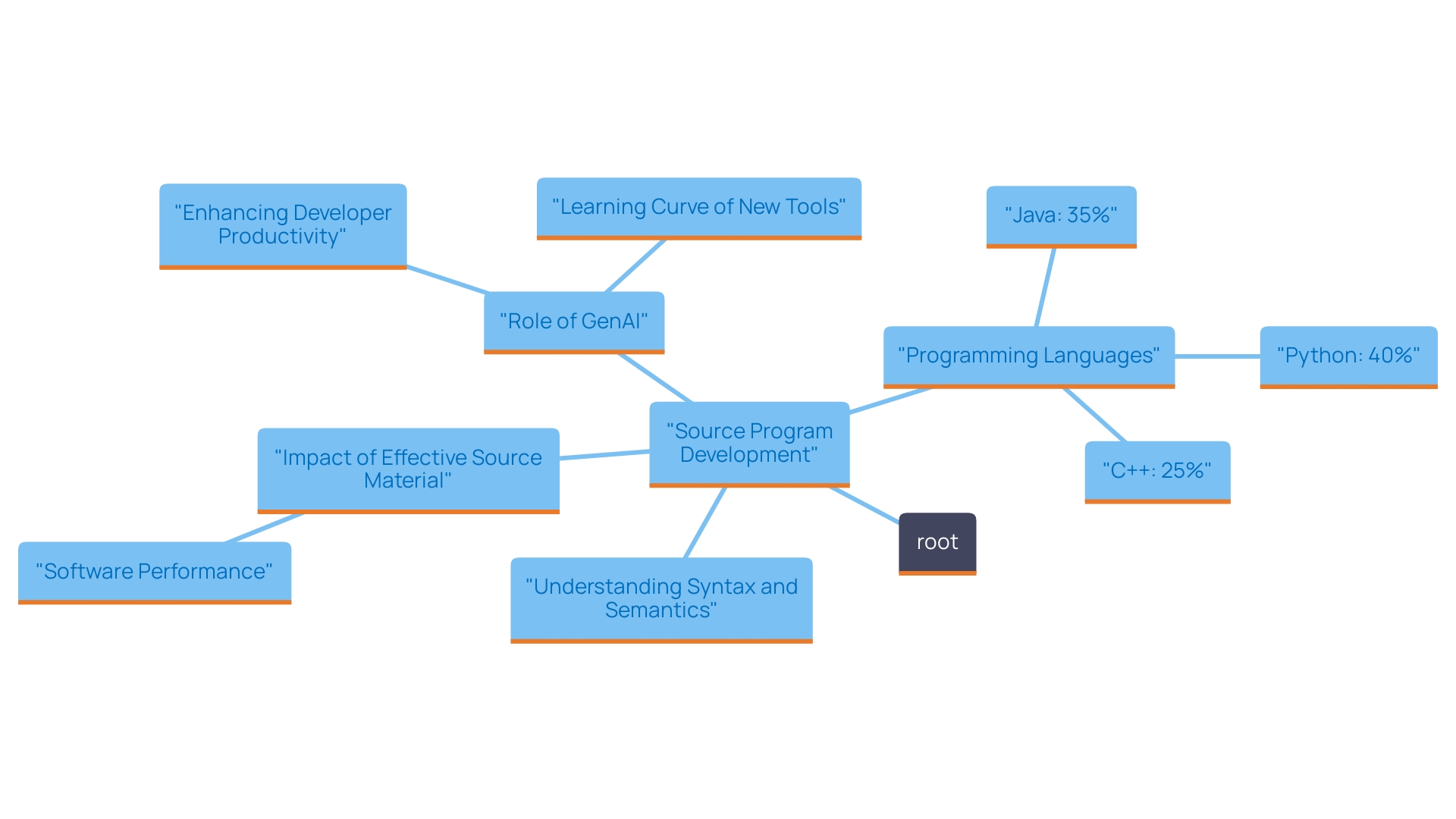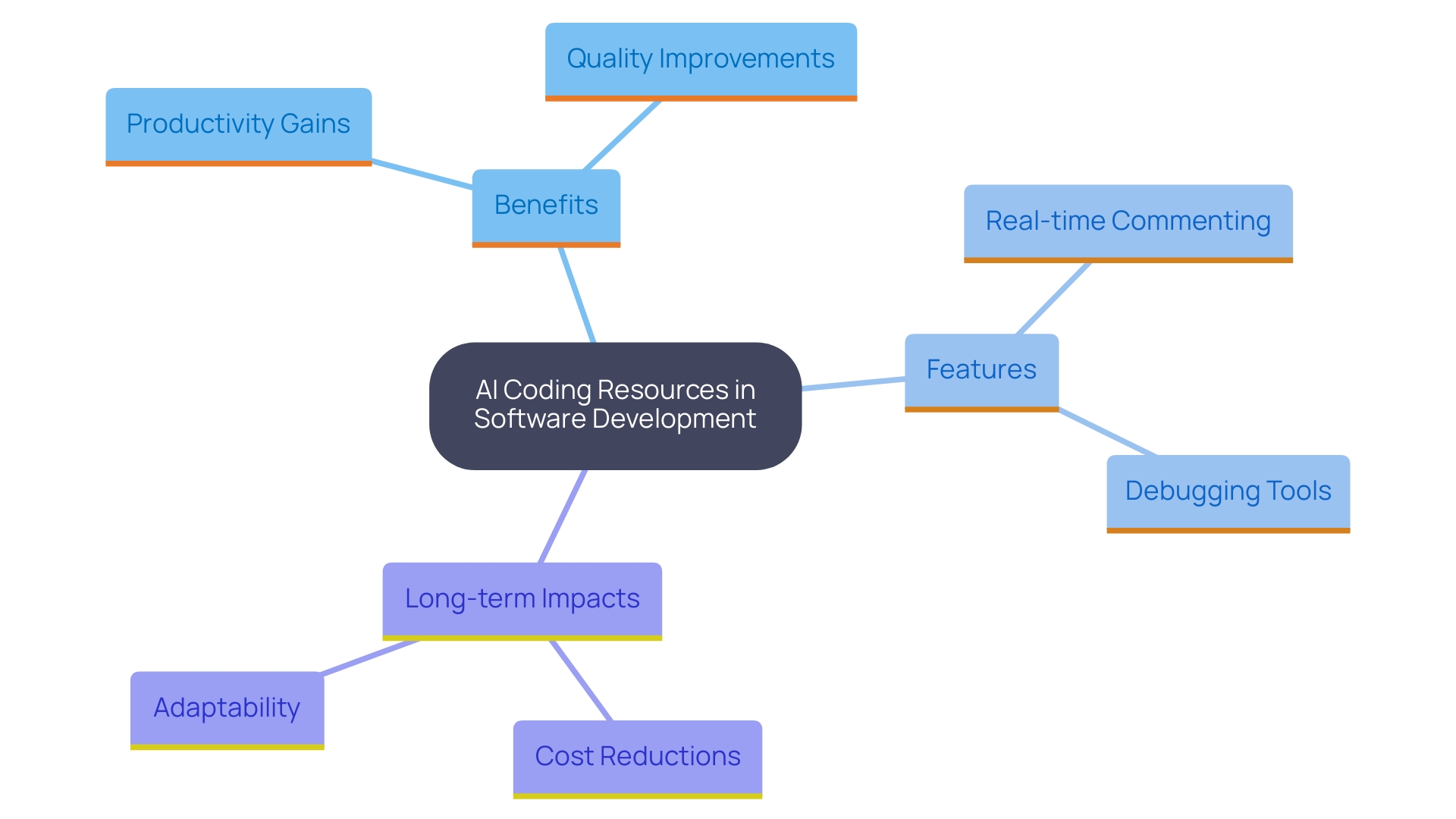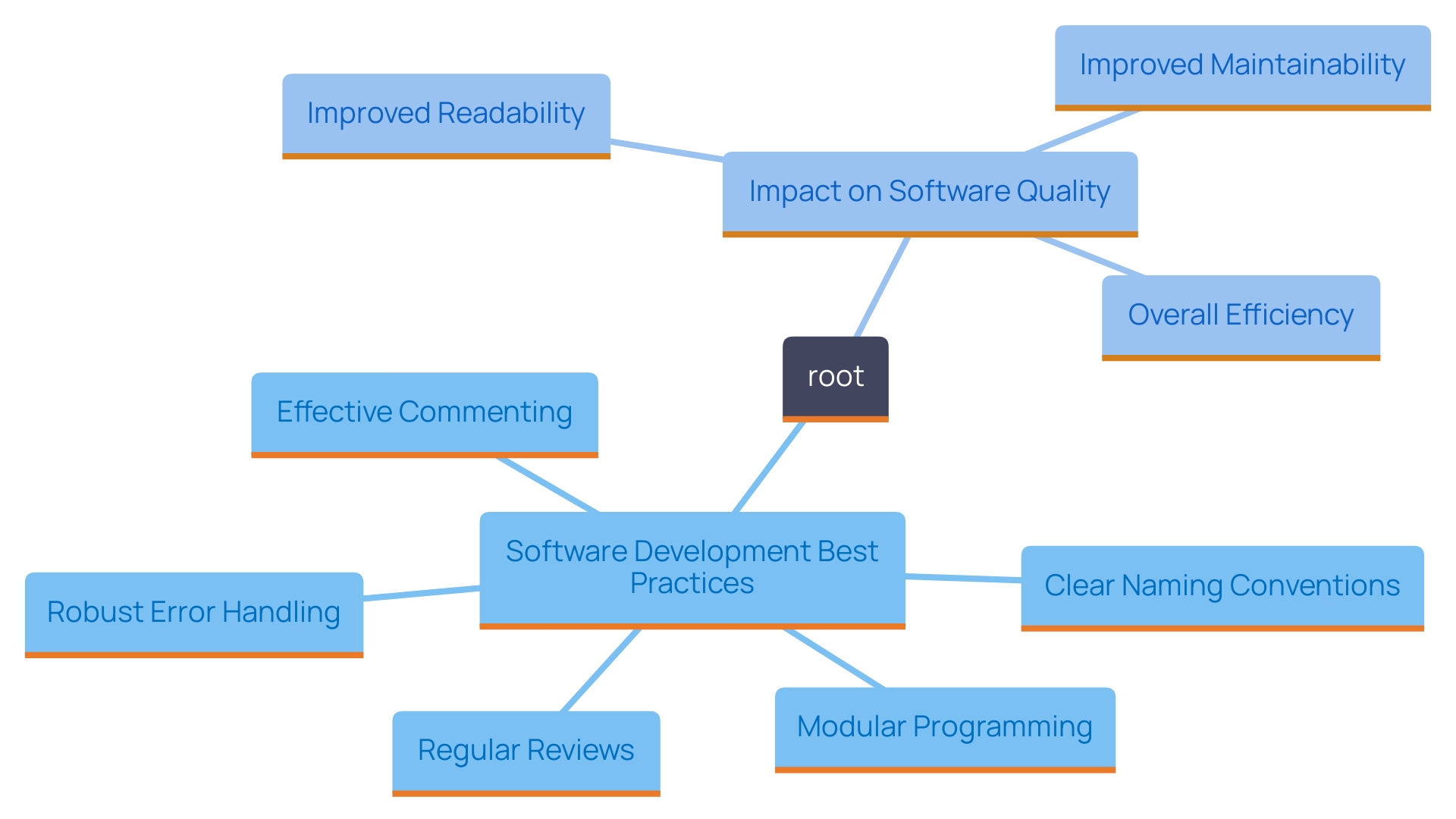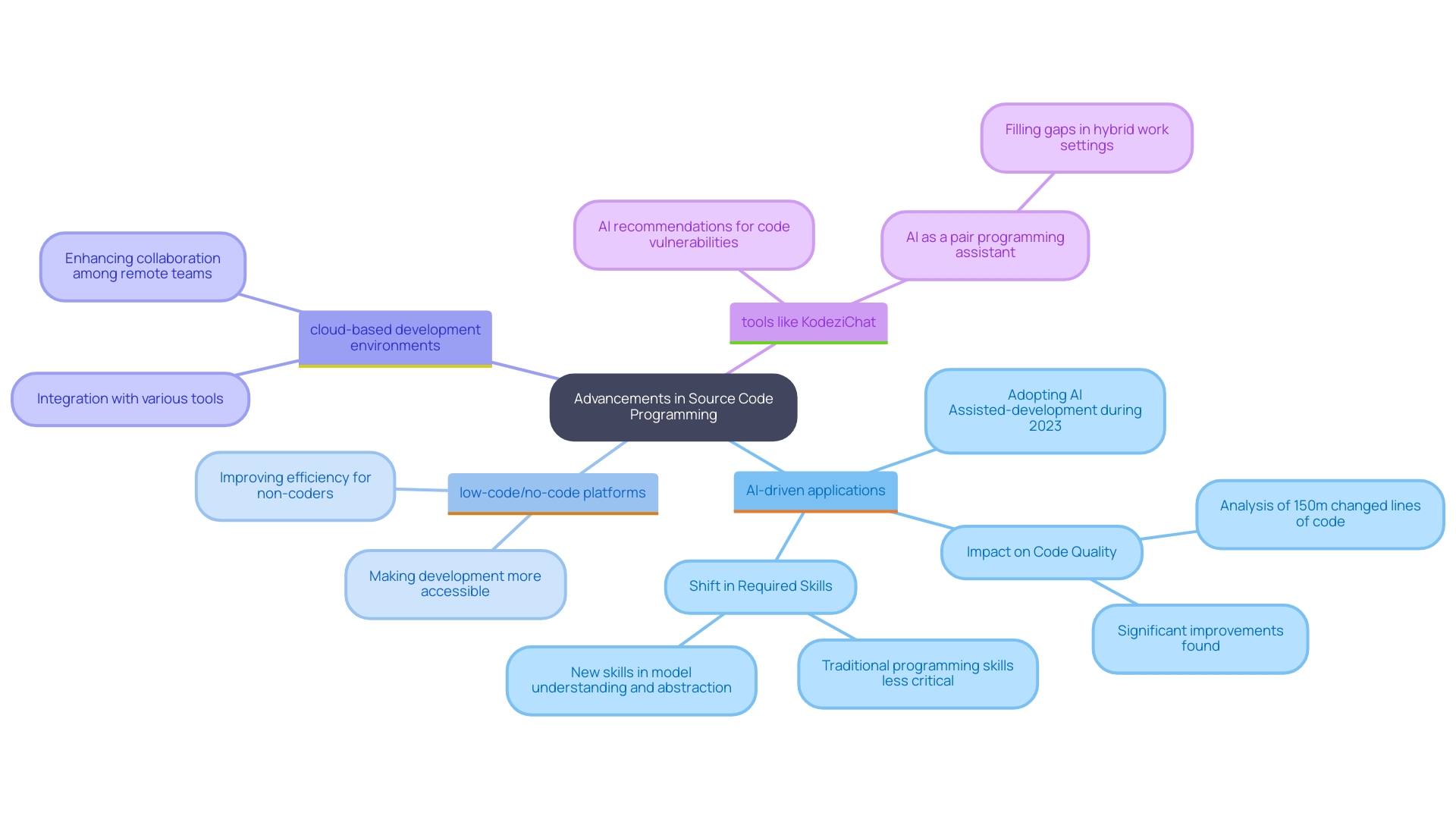Introduction
In the dynamic realm of software development, the significance of source code programming cannot be overstated. As the backbone of any application, source code dictates functionality and performance, making it imperative for developers to master the art of coding. With the rise of advanced tools like Kodezi, programmers are now equipped to enhance their productivity and streamline their workflows like never before.
From simplifying debugging processes to optimizing code quality, Kodezi offers a suite of features designed to empower developers at every stage of the coding journey. As the landscape continues to evolve, understanding the essentials of source code, coupled with the right tools, positions developers to not only meet the demands of today but to drive innovation for the future.
Understanding the Basics of Source Code Programming
Source program development involves crafting detailed instructions in a programming language to build software applications. It serves as the blueprint for software development, dictating a program's behavior and interactions with users and systems. High-level programming languages like Python, Java, and C++ are commonly used for their readability and ease of use. Each line of source text consists of commands that a compiler or interpreter translates into machine language for execution by computers.
Understanding both the syntax and semantics of a programming language is vital for producing efficient source code. As Benedict Evans aptly observes, 'It covers everything interesting I’ve seen in tech and mobile with my view on why it matters,' highlighting the significance of grasping these fundamentals. In 2024, Python remains dominant with 29% usage among programmers, followed by Java at 19% and C++ at 12%. This highlights the importance of mastering these languages for individuals aiming to optimize application functionality.
Effective source material directly impacts software performance. A practical illustration is GitHub’s Explore, a weekly email that highlights trending repositories, helping developers discover popular projects and trends within the GitHub community. This illustrates the real-world effect of well-crafted source material in software development.
To enhance your programming productivity, consider utilizing this versatile tool for programmers that offers features like its CLI, which can auto-heal codebases in seconds. After logging in with Google Authentication, users can access a variety of AI functionalities, including debugging, optimizing, translating, generating documentation, and program generation. For instance, to generate documentation, simply click the Generate Documentation button (ctrl+g) and select options such as Line By Line Commenting, Code Summary, or Docstring. Keep in mind that this tool does not support extremely large sections of programming, so you may need to select a smaller block for Docstring generation.

The Importance of Source Code in Software Development
Source text forms the core of any software application, dictating its functionality and overall performance. Recent surveys, including a study by the Software Engineering Institute, reveal that 70% of programmers experience significant benefits from utilizing AI coding resources that simplify the coding process and boost productivity. Isaac Lyman, a respected author, emphasizes that beyond sheer output, the quality of the program and the level of team collaboration remain paramount performance metrics.
A case study showcasing the application of AI coding instruments demonstrates that developers believe these tools can enhance their performance by ensuring high-quality output and quicker delivery times. For example, a group that embraced the platform reported a 30% reduction in review time and a significant improvement in quality, illustrating that the emphasis should stay on quality instead of quantity to genuinely gain from these advancements.
Moreover, Kodezi's well-crafted source material simplifies collaboration among team members. Features such as real-time commenting and integrated debugging tools enable clean, organized programming that is more accessible and easier to understand. This not only fosters a more collaborative environment but also enables the implementation of optimization techniques that enhance performance and security. Leaders can further empower their teams by providing training and resources for upskilling, ensuring that everyone is equipped to contribute effectively.
In the long term, prioritizing source quality is essential. It affects immediate project outcomes and influences long-term maintenance and adaptability to new requirements. Following the latest best practices in software development, as provided by the platform, can result in significant cost reductions and a shorter time-to-market for software solutions, making it an essential element of efficient and effective software creation. User testimonials highlight that Kodezi has transformed debugging and enhanced productivity for over 1,000,000 users, showcasing its impact on debugging efficiency and user-friendly features among programmers.

Best Practices for Writing Effective Source Code
To achieve maximum efficiency and productivity in software development, adhering to best practices for writing effective source material is essential. Clear and consistent naming conventions for variables, functions, and classes significantly enhance readability and maintainability. Expert opinions emphasize that strong priors in coding, such as utilizing established frameworks and guidelines, can prevent labeling degeneracy, ensuring clarity in complex projects. Research indicates that teams adhering to standardized naming conventions report a 30% increase in understanding among new developers.
Modular programming, which involves breaking down software into smaller, reusable functions or classes, facilitates easier testing and maintenance. This approach aligns with the latest trends in programming readability and maintainability, such as the shift towards functional paradigms that emphasize immutability and side-effect-free functions.
Incorporating comments judiciously to explain intricate logic or workflows aids in understanding the purpose, both for collaborators and one’s future self. The Extension enhances this process by automatically delivering line-by-line remarks on the purpose of each segment, which can save considerable time and enhance understanding, particularly for new or intricate scripts. Furthermore, the platform provides a multi-line summary that describes what the program will achieve as it runs, further improving clarity.
Error handling and exception management are critical in ensuring applications can handle unexpected situations gracefully, maintaining robustness. The debugging feature aids in this area by automatically analyzing issues and offering corrections, ensuring that the program is compilable and functional. Notably, Kodezi does have limitations when managing extremely large sections of programming, which may require users to select smaller blocks for effective debugging.
Regular reviews are impactful in enhancing software quality. For instance, case studies on repulsive priors for mixture components illustrate how careful separation of components can prevent issues like bowtie geometry, highlighting the importance of collaborative review processes. This case study reinforces the practice of maintaining clear separation in program components to avoid confusion and enhance maintainability. Utilizing version control systems further streamlines collaboration and maintains a comprehensive history of changes.
These practices not only enhance the immediate functionality of the system but also aid in its long-term maintainability and overall efficiency. By utilizing resources to automate programming corrections, bug evaluations, and documentation creation, developers can improve their development efforts across various languages and IDEs, ultimately resulting in superior quality and more dependable software.

The Future of Source Code Programming
The landscape of source code programming is undergoing a significant transformation, driven by advancements in artificial intelligence, automation, and cloud computing. AI-driven applications are transforming the coding process by proposing enhancements and detecting vulnerabilities instantly, significantly reducing review time by 50%. The CLI functions as a flexible resource for teams, allowing them to automatically restore codebases in seconds and removing the time spent on pull requests. These resources are crucial for programmers seeking to improve efficiency and simplify processes.
While the rise of low-code and no-code platforms is broadening the pool of creators, this platform stands out by offering robust solutions that cater to both experienced programmers and those new to coding. In contrast to platforms like OutSystems, Mendix, and Bubble, this solution offers greater integration with programming practices, ensuring that programmers can utilize robust resources while retaining authority over their work.
Furthermore, KodeziChat provides an AI-driven solution for rapid coding question resolution, enabling programmers to find and solve code issues in a matter of seconds. The shift to cloud-based development environments enhances collaboration, enabling teams to work seamlessly from any location. This flexibility is crucial for modern development teams that prioritize agility and responsiveness. Expert predictions suggest that staying abreast of these trends, including the adoption of Kodezi's innovative tools, will be vital for programmers to remain effective and innovative in a rapidly evolving technological landscape.
Embracing these advancements empowers developers to focus on solving complex problems rather than mundane tasks, ultimately driving greater innovation and efficiency in software development.

Conclusion
The importance of source code programming in the software development landscape cannot be overstated. As the fundamental blueprint for applications, mastering programming languages like Python, Java, and C++ is crucial for developers aiming to enhance functionality and performance. The integration of advanced tools such as Kodezi is revolutionizing the coding process, streamlining workflows, and significantly boosting productivity.
By prioritizing best practices in source code development, such as clear naming conventions, modular programming, and effective error handling, developers can create high-quality code that stands the test of time. Kodezi's features, like automated documentation generation and real-time debugging assistance, empower programmers to focus on writing efficient code while minimizing time spent on corrections and reviews. The positive impact of these practices is further illustrated by user testimonials and case studies, highlighting substantial improvements in code quality and project delivery times.
Looking ahead, the future of source code programming is bright, driven by advancements in AI and cloud computing. Tools like Kodezi are not only enhancing the capabilities of seasoned developers but also making coding more accessible to newcomers. By embracing these innovations, developers can harness the power of technology to drive efficiency and foster collaboration, ultimately leading to a new era of creativity and innovation in software development.
Discover how Kodezi can transform your coding experience—start your free trial today!
Frequently Asked Questions
What is source code and its role in software development?
Source code involves crafting detailed instructions in a programming language to build software applications. It serves as a blueprint for software development, dictating a program's behavior and interactions with users and systems.
Which programming languages are commonly used for source code?
High-level programming languages commonly used include Python, Java, and C++, known for their readability and ease of use.
Why is understanding syntax and semantics important in programming?
Understanding both the syntax and semantics of a programming language is vital for producing efficient source code, ensuring that the code functions as intended.
What are the usage statistics for programming languages in 2024?
In 2024, Python leads with 29% usage among programmers, followed by Java at 19% and C++ at 12%.
How does effective source material impact software performance?
Effective source material directly influences software performance, as demonstrated by tools like GitHub’s Explore, which helps developers discover popular projects and trends.
What features does Kodezi offer to enhance programming productivity?
Kodezi provides features such as a command line interface (CLI) for auto-healing codebases, debugging, optimizing, translating, and generating documentation.
What are the benefits of using AI coding resources?
Surveys show that 70% of programmers benefit from AI coding resources, which simplify the coding process and boost productivity, leading to high-quality output and quicker delivery times.
How does Kodezi facilitate team collaboration?
Kodezi enhances collaboration through features like real-time commenting and integrated debugging tools, making programming more organized and accessible.
Why is prioritizing source quality important in software development?
Prioritizing source quality affects immediate project outcomes and long-term maintenance and adaptability, leading to cost reductions and shorter time-to-market for software solutions.
What best practices should be followed for writing effective source material?
Best practices include clear naming conventions, modular programming, judicious commenting, effective error handling, and regular reviews to enhance readability and maintainability.
How does AI influence the coding process?
AI-driven applications propose enhancements and detect vulnerabilities instantly, significantly reducing review time and improving efficiency in the coding process.
What is the significance of cloud-based development environments?
Cloud-based development environments enhance collaboration, allowing teams to work seamlessly from any location, which is crucial for modern development teams.
How do advancements in technology impact software development?
Advancements in AI, automation, and cloud computing empower developers to focus on solving complex problems, driving greater innovation and efficiency in software development.




